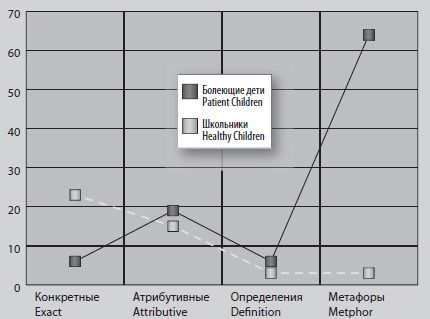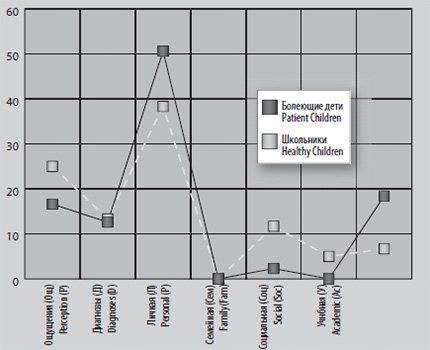Article
Kharkovskiy A.N. (2015). Disease representation in children and its mediating role in the therapeutic work with patient children. National Psychological Journal. 3, 105-116.
Abstract
In the course of treating a serious illness, a person is faced with questions related not only to the medical side of treatment, but also with the realizing the sense of the events. This is equally true for both oncology adults and for children.
The paper researches the disease representation in children who suffer from severe diseases. General psychological aspects of the disease situation and the understanding of patient children and the ability to use these concepts in practical psychological help are considered.
The study hypothesizes, first of all, the semantic structure of representation in this group of children having specific characteristics that distinguish them from healthy children. Secondly, data representation having a therapeutic potential can be used as a psychological tool. Mediating function of the psychological tools mentioned is justified in this paper from the perspective of cultural historical approach and the concept of mental health levels. The experimental study was conducted in the specialized pediatric clinics in Moscow, Russia. Control group include students of one of Moscow schools. The study included organization of the experimental situation, criteria for obtaining data, comparative analysis and evaluation.
The hypothesis is confirmed. The characteristic structure of disease representations in patient children reflecting some vector of the disease course is outlined. This makes the study an important practical value as the results may provide a solution to practical issues of medical psychology in assisting patient children. The research offers further studying the semantic sphere of patient children.
Accepted: 08/20/2015
Pages: 105-116
DOI: 10.11621/npj.2015.0311
PDF: Download
Keywords: disease; pediatric oncology; image of the disease; psychological tool; meaning;
Available Online 15.11.2015
Table 1.
|
Participant Group
|
Number of Participants |
Number of Comparisons |
Mean number of comparisons in the group |
|
Patient Children |
51 |
93 |
1,8 |
|
School Students |
41 |
44 |
1,0 |
Table 2. Factor of Individual Significance.
|
Patient Children |
Healthy Children |
|||
|
Answer Category |
Number of Answers |
% of the Total Amount |
Answer Category |
Number of Answers |
|
Formal Answer (F) |
43 |
46,2 |
10 |
22,7 |
|
Answer of Individual Significance (I) |
50 |
53,8 |
34 |
77,3 |
|
Total: |
93 |
100,0 |
44 |
100,0 |
|
Average |
46,5 |
|
22 |
|
|
Regular Deviation |
4,9 |
|
17 |
|
Table 3. Abstractness Factor
|
Patient Children |
Healthy Children |
|||
|
Answer Category |
Number of Answers |
% of the Total Amount |
Number of Answers |
% of the Total Amount |
|
Exact Answer (E) |
6 |
6,3 |
23 |
52,3 |
|
Attributive Answer (А) |
19 |
20,0 |
15 |
34,1 |
|
Definition(D) |
6 |
6,3 |
3 |
6,8 |
|
Metaphor (М) |
64 |
67,4 |
3 |
6,8 |
|
Total: |
95 |
100,00 |
44 |
100,0 |
|
Average |
23,8 |
|
11 |
|
|
Regular Deviation |
27,5 |
|
10 |
|
Table 4. Levels of disease awareness
|
Patient Children |
Healthy Children |
|||
|
Issues to Describe |
Number of Answers |
% of the Total Amount |
Number of Answers |
% of the Total Amount |
|
Symptoms (P) |
14 |
16,3 |
15 |
25,0 |
|
Names of Diseases (D) |
11 |
12,6 |
8 |
13,3 |
|
Personal Issue (P) |
44 |
50,6 |
23 |
38,3 |
|
Family Issue (Fam) |
0 |
0,0 |
0 |
0,0 |
|
Social Relations (Soc) |
2 |
2,3 |
7 |
11,7 |
|
Professional Issue (Ac) |
0 |
0,0 |
3 |
5,0 |
|
Highest Sense Issue (HS) |
16 |
18,4 |
4 |
6,7 |
|
Total: |
87 |
100,0 |
60 |
100,0 |
|
Average |
12,4 |
|
9 |
|
|
Regular Deviation |
15,5 |
|
7,6 |
|
Graph 1. Abstractness Factor

Graph 2. Levels of disease awareness

References
Abramenkova, V.V. (2007) Otrazhenie kartiny mira sovremennykh rossiyskikh detey v graficheskikh i verbal'nykh obrazakh [Reverberation of the world picture in the graphic and verbal images of contemporary Russian children]. Voprosy psikhologii [Issues of Psychology], 7.
Aralova, M.P. (2001) Rol' i mesto geshtal't-terapii detey s onkopatologiey v strukture psikhosotsial'noy sluzhby detskogo onkotsentra [The role and place of Gestalt therapy in children oncopathology in the structure of children's psychosocial service cancer center]. Teoriya i praktika geshtal't-terapii na poroge XXI veka [InTheory and Practice of Gestalt therapy at the threshold of the 21st century]. Rostov-on-Don.
Belyy, B.I. (2005) Test Rorshakha. Praktika i teoriya [Rorschach test. Practice and theory]. St. Petersburg.
Bobrov, N.P. (2004) Sashen'ka. Posledniy god [Sashen’ka. The last year]. Moscow.
Bratus’, B.S. (1988) Anomalii lichnosti [Abnormalities of personality].
Bratus’, B.S. (1981) K izucheniyu smyslovoy sfery lichnosti. [On studying the semantic sphere of personality]. Vestnik Moskovskogo Universiteta [Bulletin of Moscow University]. Series 14 "Psychology", 2, 48.
Bratus’, B.S. (2004) Leont'evskie osnovaniya smyslovykh kontseptsiy lichnosti [Leontiev’s base semantic concepts of personality psychology]. Voprosy psikhologii [Issues of psychology]. 4.
Bratus’, B.S. Rozovskiy, I.J., & Tsapkin, V.N. (1988) Psikhologicheskie problemy izucheniya i korrektsii anomaliy lichnosti [Psychological issues of studying and correction of anomalies of personality. MGU.
Burlachuk, L.F., & Morozov, S.M. (1989) Slovar'- spravochnik po psikhologicheskoy diagnostike [A guide to psychological diagnostics]. Kiev.
Byalik, M.A. (2000) Mezhdunarodnyy i otechestvennyy opyt sozdaniya i funktsionirovaniya sistemy sotsial'noy i psikhologicheskoy podderzhki detey s onkologicheskimi zabolevaniyami i ikh semey [International and local experience of creation and functioning of the social and psychological support to children with cancer and their families]. Palliativnaya meditsina I reabilitatsiya [Palliative Medicine and Rehabilitation], 4.
Dahl’, V.I. Tolkovyy slovar' zhivogo velikorusskogo yazyka [Explanatory Dictionary of the Russian language]. (electronic version)
Fasmer (1985) Etimologicheskiy slovar' russkogo yazyka [Etymological dictionary of the Russian language]. Vol.1.
Frank, G. (1995) Zhit' s opukhol'yu [Living with a tumor].
Frankl, V. (1990) Chelovek pered litsom smysla [Man faced with the meaning]. Moscow.
Frankl, V. (2000) Osnovy logoterapii [Fundamentals of logotherapy]. St. Petersburg.
Kherson, B.G. (2003) Metod piktogramm v psikhodiagnostike [Method icons in psychological diagnostics]. St. Petersburg, Sensor.
Khlunovskiy, A.V. (1997) Konceptsiya bolezni [Concept of disease]. Soznanie i fizicheskaya real'nost' [Consciousness and Physical Reality]. Vol.2, 1.
Leontiev, A.N. (1977) Deyatel'nost'. Soznanie. Lichnost' [Activities. Consciousness. Personality]. Moscow, Politizdat.
Leontiev, D.A. (2000) Tematicheskiy Appertseptivnyy Test [Thematic Apperception Test]. Moscow, Smysl.
Luria, A.R. (1967) Lektsii po psikhologii pamyati [Lectures on the psychology of memory]. Moscow, MGU, 76.
Lyashevskiy, O., & Sharov, S.A. (2009) Chastotnyy slovar' sovremennogo russkogo azyka (na materialakh Natsional'nogo korpusa russkogo yazyka) [Frequency dictionary of modern Russian language (based on f the Russian National Corpus)]. Moscow, Azbukovnik.
Mazur, E.S. (1983) Problema smyslovoy regulyatsii v svete idey L.S. Vygotskogo [The problem of semantic regulation in the light of L.S. Vygotsky’s ideas]. Vestnik Moskovskogo universiteta [Bulletin of Moscow University]. Series 14, Psychology, 1.
Mills, J., & Crowley, R. (1996) Terapevticheskie metafory dlya detey i vnutrennego rebyonka [Therapeutic metaphors for children and the inner child]. Moscow.
Nikolaeva, V.V. (1987) Vliyanie khronicheskoy bolezni na psikhiku [Impact of chronic disease on the psyche]. Voprosy korrektsii [Issues of Correction] MGU, 101
Orlova, T.V. (2014) Kratkosrochnyy variant metoda terapii tvorcheskim samovyrazheniem Burno dlya primeneniya v palliativnoy onkologii [Short-term version of Burno creative self-expression method for treating palliative cancer. Konsul'tativnaya psikhologiya i pskihoterapiya [Counseling Psychology and psychotherapy]. 1.
Osorina, M.V. (1977) Ispol'zovanie metoda piktogramm pri issledovanii myshleniya [Using pictograms in the study of thinking]. Diagnosticheskie metody v klinicheskoy psikhologii [Diagnostic methods in clinical psychology]. Leningrad.
Petlenko, V.P., & Sergeantov, V.F. (1984) Problema cheloveka v teorii meditsiny [The issue of human in medical theory]. Kiev.
Petrenko, V.F. (1988) Psikhosemantika soznaniya [Psychosemantics of consciousness]. Izdatel’stvo MGU.
Potanina, L.T., & Gusev, A.N. (2008) Svyaz' obrazno-simvolicheskogo myshleniya s razvitiem tsennostno-smyslovykh predstavleniy lichnosti [Interrelation of figurative and symbolic thinking with the development of value semantic representations in the human individual]. Voprosy psikhologii [Issues of Psychology]. 2.
Pokrovskiy, V.I. (2005) Entsiklopedicheskiy slovar' meditsinskikh terminov [Encyclopedic Dictionary of medical terms]. Moscow.
Rossi, E. (1986) The psychobiology of mind-body healing. N.Y.
Sigel B. Love, medicine and miracle. N.Y. 1986
Sokolova, E.T. (1980) Proektivnye metody issledovaniya lichnosti [Projective methods of personality research]. Moscow, Izdatel’stvo MGU, 174.
Sokolova, E.T., & Nikolaeva, V.V. (1995) Osobennosti lichnosti pri pogranichnykh rasstrokystvakh i somaticheskikh zabolevaniyakh [Personality traits in borderline disorders and somatic diseases]. Moscow.
Shuttsenberg, A.A. (1990) Tyazhelobol'noy patsient [Critically ill patients]. Voprosy psikhologii [Issues of Psychology]. 5.
Simonton, O., Simonton, S., & Creigton, J. (1978) Getting well again, LA.
Tsahert, K. & Tsahert, I. (1997) Vstretimsya v rayu [I'll see you in heaven]. Moscow.
Vasilyuk, F.E. (1984) Psikhologiya perezhivaniya (analiz preodoleniya kriticheskikh situatsiy) [Psychology experience (analysis of overcoming crisis situations)]. Moscow.
(1995) V pomoshch' roditelyam, dumayushhim o tom, kak govorit' s rebyonkom o ego bolezni [Helping parents to talk with their child about his/her illness], Moscow.
Vygotsky, L.S. (1983) Sobranie sochineniy [Collected Works]. Vol. 3, Moscow.
Zenkovsky, V.V. (1993) Problemy vospitaniya v svete khristianskoy antropologii [Issues of education in the light of Christian anthropology]. Moscow.
For citing this article:
Kharkovskiy A.N. (2015). Disease representation in children and its mediating role in the therapeutic work with patient children. National Psychological Journal. 3, 105-116.


